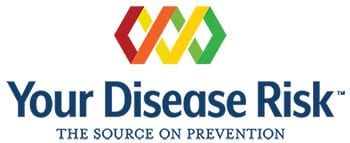Your Disease Risk is one of the longest running, publicly available health risk assessments on the Internet. Launched in early 2000 and continually updated to the present time, the site offers risk assessments for 12 different cancers plus four other important chronic diseases: heart disease, stroke, diabetes and osteoporosis.
Developed by chronic disease epidemiologist Graham Colditz, MD, DrPH, the site began in 1998 as a pen-and-paper questionnaire called the Harvard Cancer Risk Index1,2. However, with the personalization possible with an Internet-based tool, the Harvard Cancer Risk Index was developed into an online assessment and renamed Your Cancer Risk and offered assessments for four cancers: breast, colon, lung and prostate. The site was launched in January 2000, and six months later, eight additional cancers were added, bringing the total to 123.
In 2004, heart disease, stroke, diabetes and osteoporosis were added to the tool, and the site was renamed Your Disease Risk to better reflect the range of disorders covered by the assessment. Because many common chronic diseases share risk factors, the expansion of the site to Your Disease Risk was thought to better promote the importance of a healthy lifestyle to lowering disease risks and improving health.
In 2007, the site moved from the Harvard Center for Cancer Prevention at the Harvard School of Public Health to the Alvin J. Siteman Cancer Center at Washington University School of Medicine in St Louis.
User Experience
Your Disease Risk has a simple, straightforward interface. Questionnaires can be completed in a matter of minutes. For each disease, the site offers both a visual and verbal risk estimate as well as personalized tips for prevention. The site can also show users what their risk could be should they adopt various healthy behaviors. Tailored screening tips and recommendations for making health changes in communities are also part of site results. Through 2010, average use was 1,200 visitors per day with an average visit of 13 page views. Substantial increases are noted after major media coverage, such as posts on the New York Times or an expert appearance on “The Dr. Oz Show.”
Methodology
The calculations and algorithms used to calculate and display risk estimates in Your Disease Risk are the product of an ongoing process of expert consensus1. Epidemiologists, clinicians and other health specialists regularly review the current scientific evidence for each disease, identifying the established and probable risk factors of each. This information is then used to develop or revise calculations that generate a user’s risk of disease compared to average risk in the population for someone of the same age and sex.
In a published validation study, Your Disease Risk was found to provide well-calibrated estimates of cancer risk relative to the general population4. For women, discriminatory accuracy for colon cancer was 0.67, for ovarian cancer 0.59, and for pancreatic cancer was 0.71. For men, discriminatory accuracy for colon cancer was 0.71 and for pancreatic cancer was 0.72. These values exceed performance of many other cancer risk prediction tools including the Gail model for breast cancer risk5,6.
The approach used to calculate cancer risks in Your Disease Risk are used to calculate the risks of other diseases on the site (heart disease, stroke, diabetes and osteoporosis). Validation studies of these are ongoing.
Awards and Media
A winner of the eHealthcare Leadership Award (Strategic Health Care Communications. Best Interactive Site. 2008 eHealth Leadership Award), Your Disease Risk has also been the topic of multiple articles from major media outlets, including: The Wall Street Journal, New York Times7, Guardian Online8, and U.S. News and World Report9.
- Colditz G, Atwood K, Emmons K, et al. Harvard Cancer Risk Index. Cancer Causes Control. 2000;11:477-488.
- Emmons K, Koch-Weser S, Atwood K, Conboy L, Rudd R, Colditz G. A qualitative evaluation of the Harvard Cancer Risk Index. J Health Communication. 1999;4:181-193.
- Voelker R. Quick uptakes: online risk assessment expands. JAMA. Jul 26 2000;284(4):430.
- Kim DJ, Rockhill B, Colditz GA. Validation of the Harvard Cancer Risk Index: a prediction tool for individual cancer risk. J Clin Epidemiol. Apr 2004;57(4):332-340.
- Rockhill B, Spiegelman D, Byrne C, Hunter DJ, Colditz GA. Validation of the Gail et al. model of breast cancer risk prediction and implications for chemoprevention. J Natl Cancer Inst. 2001;93(5):358-366.
- Park Y, Freedman AN, Gail MH, et al. Validation of a colorectal cancer risk prediction model among white patients age 50 years and older. J Clin Oncol. Feb 10 2009;27(5):694-698.
- Park-Pope T. Favorite Health Resources. New York Times 2008.
- Revill J. Harvard can now asses your health risks via the internet. The Guardian. July 4, 2004, 2004.
- Annonymous. Health: Finding a Diagnosis. US News and World Report. 2006.
